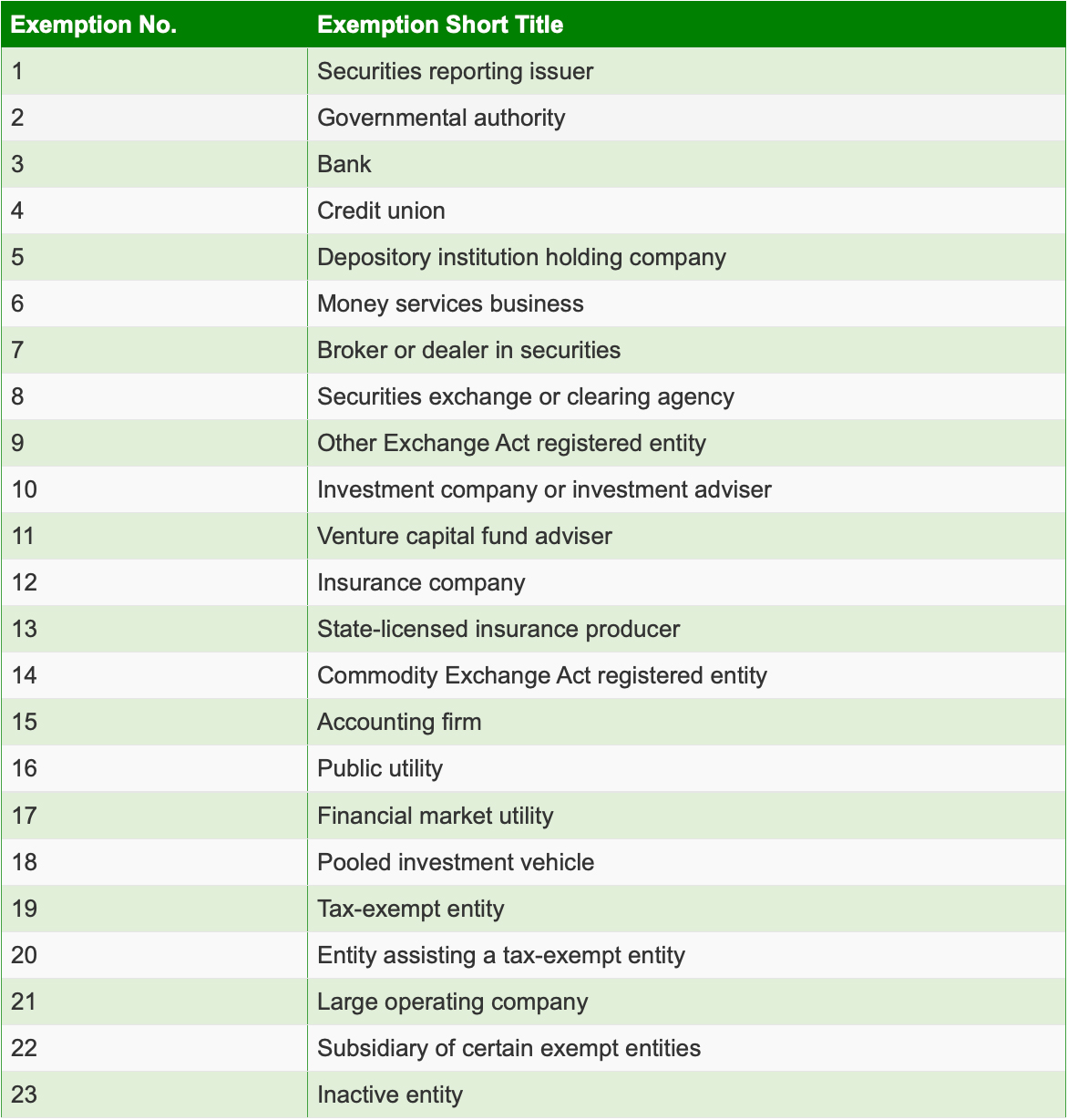The Corporate Transparency Act (“CTA”) was enacted January 21, 2021 and is implemented through regulations established by the Financial Crimes Enforcement Network (“FINCEN”), a bureau of the US Department of the Treasury. The regulations require “reporting companies” to report information about their beneficial owners to FINCEN to be stored in a secure, non-public database. Reporting requirements became effective January 1, 2024.
Reporting Companies
Reporting companies are defined as corporations, limited liability companies, or other similar entities that are: (i) created by the filing of a document with a secretary of state or similar office under the laws of a United States (“US”) State or Indian tribe, or (ii) formed under the law of a foreign country and registered to do business in the US by the filing of a document with a secretary of state or similar office under the laws of a US State or Indian tribe.
Information to be Provided
Reporting companies must disclose the company’s legal and trade name(s), jurisdiction of formation, business address and taxpayer identification number; and each beneficial owner’s: (i) name, (ii) date of birth, (iii) residential address and (iv) an identification document with a unique identifying number from a non-expired US driver’s license or passport, a non-expired identification document issued by a US State or territory, local government or Indian tribe or, if the beneficial owner does not have either of the previously mentioned forms of identification, a non-expired foreign passport. If a reporting company was formed after January 1, 2024, the company must also report the information required of beneficial owners for its company applicant, as defined below.
Beneficial Owners and Company Applicants
Beneficial owners are defined as any individual, who either directly or indirectly, (i) exercises substantial control over the reporting company or (ii) owns or controls more than a 25% interest in the reporting company. An individual is deemed to exercise substantial control over the reporting company if they are: (i) a senior officer, (ii) authorized to appoint or remove officers or a majority of the directors (or governing body) of the reporting company, (iii) make decisions about the reporting company’s business, finances and/or structure or (iv) anyone who has substantial influence over the aforementioned important decisions.
A company applicant is the individual who files the formation or registration paperwork for the reporting company. If more than one person was involved, the individual primarily responsible for the filing is the company applicant. If the company applicant acted in a professional capacity, such as attorney or formation agent, reporting companies may report the company applicant’s business address when filing their initial report.
Exempt Entities
There are several categories of companies exempt from reporting requirements. Entities in highly regulated industries, such as banking, certain investment services and insurance, that already require companies to provide ownership information to the government are exempt. Also exempt are large operating companies, tax-exempt entities, subsidiaries of certain exempt entities and inactive entities that meet certain requirements.
For an inactive entity to be deemed exempt, it: (i) must have been formed before January 1, 2020, (ii) cannot be engaged in active business, (iii) cannot have been owned by a foreign person directly or indirectly, (iv) had no change in ownership in the preceding twelve (12) month period, (v) cannot have transferred or received more than $1,000.00 in its own account or an account in which the entity or its affiliate had an interest in the preceding twelve (12) month period and (vi) cannot otherwise hold assets, including ownership interests in corporate or similar entities.
FINCEN’s published list of exempt entity categories is included at the bottom of this bulletin. The exact requirements to meet each exemption are included in the link below on pages 11-21: https://www.fincen.gov/sites/default/files/shared/BOI_Small_Compliance_Guide.v1.1-FINAL.pdf. Owners are advised to review all exemption requirements for the applicable category prior to deciding whether their entity is exempt.
What if a Corporate Entity Owns 25% or more of a Reporting Company?
If a corporate entity owns or controls 25% or more of a reporting company, then the reporting company should report information for both direct beneficial owners and indirect beneficial owners who exercise substantial control or ownership or control of at least 25% interest in the reporting company through the intermediary corporate entity.
There are two exceptions to the general rule: (i) if beneficial ownership in the reporting company is entirely through an exempt entity or entities, the reporting company may report the name(s) of the exempt entity or entities in lieu of individual beneficial owner(s); and (ii) if the beneficial owners of the reporting company and the intermediate company are the same individuals, the reporting company may report the FinCEN identifier and full legal name of the intermediate company through which the individuals are beneficial owners of the reporting company.
Compliance Dates
Compliance deadlines vary depending upon the date of the reporting companies’ formation or registration to do business. Reporting companies formed or registered before January 1, 2024 must file initial beneficial ownership information reports (“BOI Reports”) by January 1, 2025. Reporting companies formed or registered during the calendar year of 2024 must file BOI Reports ninety (90) calendar days after receiving actual notice of the company’s formation or registration. Reporting companies formed or registered on or after January 1, 2025 must file BOI Reports within thirty (30) calendar days from actual or public notice that the company’s formation or registration is effective.
Penalties for Non-Compliance
The CTA imposes civil penalties of up to $500 for each day the violation continues beyond the reporting deadline and/or criminal penalties of up to two years imprisonment and a fine of up to $10,000 on persons who willfully violate reporting requirements. Both individuals and entities who willfully provide, file or attempt to file false information may be held liable.
Who Can Access the Information
FINCEN will allow government officials and certain foreign officials who submit a request through a US Federal government agency to access reported information for authorized purposes relating to national security, intelligence, and law enforcement. Financial institutions and their regulators may also access reported information in certain circumstances and with the consent of the reporting company. Authorized parties that access beneficial ownership information are required to protect the security and confidentiality of the information and ensure that its used for authorized purposes only.
Updating Information
If there is a change to any required information after a BOI Report was filed, an updated BOI Report must be submitted no later than thirty (30) days after the date of the change.
Fees
There is no fee for the submission of BOI Reports.
BOI Reports may be completed online using the Beneficial Ownership Information E-Filing website at https://boiefiling.fincen.gov/.
If you have any questions, please reach out to one of our attorneys at 914-750-4160.


